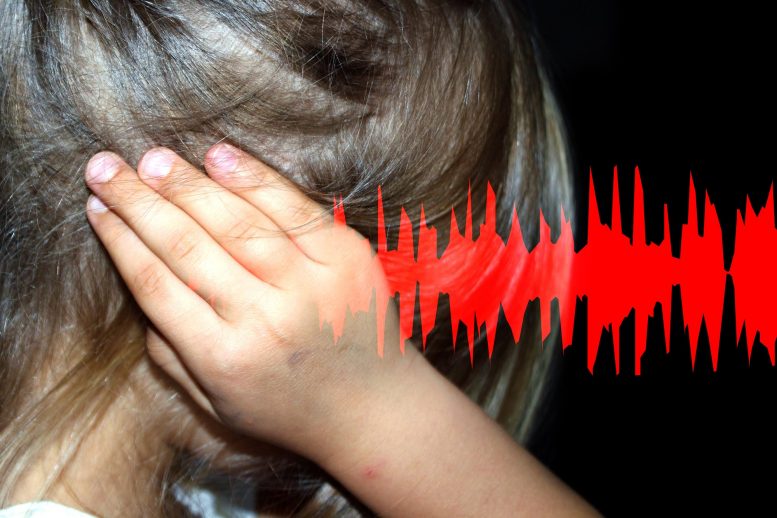
Recent research indicates that tinnitus, a condition causing perceived noise in the ear and head, is being worsened by COVID-19.
New research reveals that tinnitus, a common condition that causes the perception of noise in the ear and head, is being exacerbated by COVID-19 — as well as the measures helping to keep us safe.
The study of 3,103 people with tinnitus was led by Anglia Ruskin University (ARU), with support from the British Tinnitus Association and the American Tinnitus Association. The study involved participants from 48 countries, with the vast majority coming from the UK and the US.
Published in the journal Frontiers in Public Health, the research found that 40% of those displaying symptoms of COVID-19 simultaneously experience a worsening of their tinnitus.
Although the study focused on people with pre-existing tinnitus, a small number of participants also reported that their condition was initially triggered by developing COVID-19 symptoms, suggesting that tinnitus could be a ‘long COVID’ symptom in some cases.
Tinnitus affects an estimated one in eight adults in the UK and is associated with reduced emotional wellbeing, depression, and anxiety.
The new study also found that a large proportion of people believe their tinnitus is being made worse by social distancing measures introduced to help control the spread of the virus. These measures have led to significant changes to work and lifestyle routines.
UK respondents reported this to be a greater issue compared to people from other countries, with 46% of UK respondents saying that lifestyle changes had negatively impacted their tinnitus compared to 29% in North America.
Internal worries such as fear of catching COVID-19, financial concerns, loneliness, and trouble sleeping have contributed to making tinnitus more bothersome for 32% of people overall, with external factors such as increased videocalls, noisier home environments, homeschooling, and increased coffee and alcohol consumption also cited by respondents. Females and those under 50 found tinnitus significantly more bothersome during the pandemic.
The study noted that as well as increasing the severity of tinnitus symptoms, the COVID-19 pandemic has also made it more difficult for people to access healthcare support for the condition. This could further increase emotional distress and worsen tinnitus symptoms, creating a vicious cycle. Before COVID-19, more than eight out of 10 UK patients were already unhappy with the treatment options available from their health professionals.
Lead author Dr. Eldre Beukes, a Research Fellow at Anglia Ruskin University (ARU) in Cambridge, England, and Lamar University in Texas, said: “The findings of this study highlight the complexities associated with experiencing tinnitus and how both internal factors, such as increased anxiety and feelings of loneliness, and external factors, such as changes to daily routines, can have a significant effect on the condition.
“Some of the changes brought about by COVID-19 appear to have had a negative impact on the lives of people with tinnitus and participants in this study reported that COVID-19 symptoms are worsening or, in some cases, even initiating tinnitus and hearing loss. This is something that needs to be closely examined by both clinical and support services.”
David Stockdale, Chief Executive of the British Tinnitus Association and a co-author of the study, said: “With the second wave of COVID-19 and the resulting national lockdown likely to increase feelings of stress and isolation, it’s vital that we don’t see the same mistakes as before when it comes to community health provision for people with tinnitus.
“Poor treatment of tinnitus in the early stages often leads to much worse cases and severe tinnitus can have a huge impact on mental health. With this in mind, as the COVID-19 second wave takes hold, the healthcare system needs to ensure that anyone who develops tinnitus or experiences a worsening of their condition can access the professional healthcare support they need as quickly as possible.”
Reference: “Changes in Tinnitus Experiences During the COVID-19 Pandemic” by Eldré W. Beukes, David M. Baguley, Laure Jacquemin, Matheus P. C. G. Lourenco, Peter M. Allen, Joy Onozuka, David Stockdale, Viktor Kaldo, Gerhard Andersson and Vinaya Manchaiah, 5 November 2020, Frontiers in Public Health.
DOI: 10.3389/fpubh.2020.592878







Folks, ringing and buzzing in the ears periodically and at several pitches is emblematic of electrical sensitivity that a small percentage of the population experiences, especially if ‘hearing loss’ is not yet observed. This is generally called electro-hypersensitivity (EHS) and this impairment has often been observed to onset after a heavy immune system response (Lyme, Mold, and now perhaps Covid19), especially in folks who are already ‘sensitive’ to chemicals or have had lifetime allergies, but not necessarily limited to that group. It is not an illness, but rather an impairment impinging on the neurological system, and is likely to continue unless the offending electrical signals are remediated or avoided. Experience suggests that harmonics travelling on the home electrical wiring (sometimes called ‘dirty electricity’) or the various pulsing RF signalling we are immersed in from WIFI and cellular devices are triggering the audio nerves to tell the brain that a sound has been heard. It is disheartening to see the medical community struggling to finally notice a problem that has been present for decades, has been well-researched, but not appropriately acknowledged. It was predicted that forced stay-at-home for months, under high stress and with the heavy immune toll of Covid19 would lead to an uptick of EHS and so it appears to be (to me).
There are many online support groups for EHS, with much information about how to identify other related symptoms (fatigue, foggy brain, joint pains, chest compression and ‘palpitations’ … I believe this is a constellation of about 70 different symptoms). There are also thousands of research papers for decades showing ‘microwave illness’ and similarly named phenomena. I am sad, because most of these folks will continue to worsen (‘tinnitus’ is really just the beginning and a minor irritant compared to what may follow), now that they have initiated sensitivity, and some of their lives will take an unpleasant trajectory eventually not being able to tolerate being near any signficant electrical devices, home wiring or RF signals … ie, they may find they cannot live in their homes any longer. I know of many such cases, personally.
There is an entire chapter on ‘Hearing Electricity’ in the excellent book by Arthur Firstenberg — The Invisible Rainbow: A History of Electricity and Life
FYI, some of the largest producers of harmonics on home wiring include electronic meters (aka, ‘smart meter’), LED and fluorescent lighting, AC adapters for electronic devices, Solar PV arrays. A typical house has several thousand feet of wiring in the walls and these signals spew from such badly behaved devices onto the wiring and then radiate a few feet to where people sleep or spend many hours. One simple thing to try is to turn off the circuit breakers for the bedroom and turn off the WIfI every night at bedtime, to give one’s body a better chance to perform normal repair and recovery.